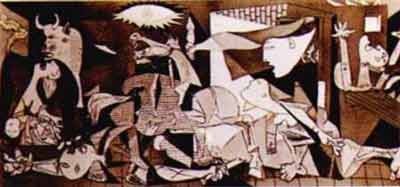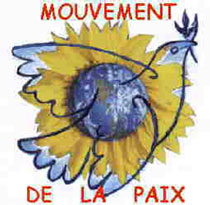An evening in the suburb:
 |
I was going by train to that dangerous city where cars are
burned and a drama, largely covered by the media, had recently
happened: the 17 years old Moussa was killed by a policeman when
he was forcing a roadblock. I was going to the suburb Cultural
Center for a meeting-debate with a Moslem sociologist and an
Algerian woman, and I wanted to visit Moussa's family. The drama
was the event of the day. In the train two young ones were reading about Moussa on a newspaper handed to them by a woman. I took the opportunity to ask them where Moussa family was living. "In the musicians quarter" they told me, "Is it far from the railway station?" yes but with the bus, it's OK". At the station they invited me to follow them in the bus. Having to get off before me they asked the conductor to drop me close to the musicians quarter. The two young ones, so friendly, left me in the bus knowing that I was in good hands. |
After a while, the conductor stopped the bus and showed me which direction to go. It was dark and it was freezing. Nobody around. I followed the direction given to me hoping to see somebody. Fortunately I found, under a light, a group of young ones that were discussing. I walked towards them to ask where the Moussa family was living. "Do you see the building over there? It is there, 3rd floor, apartment 2". I thanked them for putting me in the right direction. As soon as I knocked at the door, a young girl opened it and let me go in. In the living room there were people vividly discussing. Moussa's mother took me aside in a separate room where her husband and one of his friend were already discussing. It was Moussa's bedroom. I was offered coffee and cookies. His mother showed me a good photo of her son: a son of 17 years old with all his future in front of him! The tears in her eyes were showing both her love for him and her sorrow.
His father insisted on telling me that his son never wanted
to listen to his advice: "He always wanted to do what
he wanted. I did not know where he was taking his meals. When
he was coming back home he used to go straight to his room".
His mother was keeping silent.
They were happy to see me. Moussa was our connection; I stayed
a long time with them.
Then I went back in the cold and the dark to find the Cultural Center. As soon I saw some young ones I immediately asked them my way. They were like stars guiding me towards my goal.

- Farewell
- to
- Maria
- to
- A lorry killed Maria, leaving behind a grieving husband and a two years old son. The family is both of Basque and Portuguese origins; they are atheist except the mother who asked me to make a celebration at the Pere Lachaise cemetery. Maria had a strong impact on them. She was an activist of human rights, a citizen of the world, always fighting against injustice!
Many were coming from Corsica, Basque country, Portugal, Ireland; they assembled in the church of the famous cemetery. Each one of us received a rose with a card and an envelope, to write one's last message to Maria.
Some Basques came close to the coffin to place above it ten lamps like those painted by Picasso in "Guernica". For the Basques, they are the symbol of hope in the darkness.
tableau de Pablo Picasso "Guernica" - A poem related to death from an English author was read:
- " I am standing on the beach.
A ship is sailing in the morning breeze
towards the sea.
She is beautiful, she is alive.
I look at her until she disappears behind the horizon.
Beside me somebody says," she is gone"
Gone? Where?
Gone away from my sight, that's all!
Her mast is still upright,
Her hull is still strong to carry her crew,
She is out of sight for me but not for her.
At this moment when some body says:
" She is gone"
Others seeing her coming out from the horizon
towards them, they exclaim with joy: "She is coming!
Death is like that.- Maria's husband then began to read with emotion the speech he had prepared: "I want to tell you how much happiness Maria gave to me. And today I am discovering distress, fear and a profound sadness. From all these I was protected by her and today I am experiencing them.
Yesterday I loved her as I never loved before and this love seemed to me natural. I never questioned my love for her. Now I know why I loved her. I know now that Maria was an exceptional person, who gave me an exceptional love and during all these years she made me better.
And to all of you who knew her, I know that she left in every one of you something of herself. To this part of Maria that lives inside you, I would like to say: I love you."
The words of Jesus:" Remain in my love" from John's Gospel were well suited for this assembly so unified by love, emotion and pain.
After the coffin was put into the tomb, roses and envelops with our secrets were thrown on it. At the same time the Basques sang the song of the fight for freedom.
This was the farewell to Maria.- Farewell
Non-Violence:
| In the suburb of Paris, I was leading an evening discussion on peace; the general secretary of the Movement for Peace was there. |

|
When the general discussion was opened, the problem of security at school, in the subway or simply in the street came about. The testimony of a young girl came at the right time: "My name is Noemie. One day in the subway, a young boy attacked me with a knife. He wanted my money and my mobile. I looked at him and said: " I have no money but I have a mobile, but I will not give it to you!" Why? " he said with his knife still pointing towards me. "I need to call my mate and prepare a speech about peace in the world."
|
|
"OK then, keep your mobile". He left but came back to me to kiss me…. |
The audience applauded. One man stood up and said: " I was Noemie's professor. At school, to face violence, we took the time to learn about non-violence.